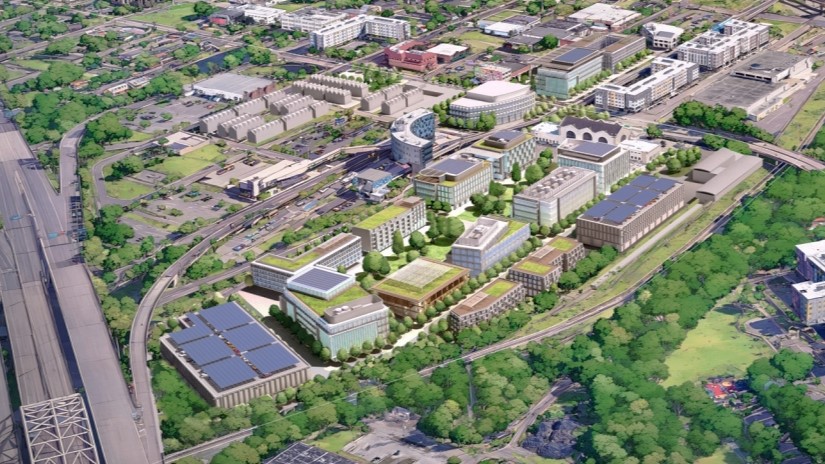Alex Sifakis sits atop a suburban Jacksonville empire: JWB, the company he co-founded in 2006, is a real-estate investment firm, a home buyer and seller, and a property manager, overseeing some 6,000 rental properties throughout the largest city by area in the contiguous United States. And in recent years, Sifakis, a gregarious and formerly obscure figure in city politics, has amassed influence, in the process expanding his considerable holdings to a new frontier: Downtown.
A new proposal, which city officials will weigh in the coming weeks, could make Sifakis and a joint venture he backs, Gateway Jax, among the most crucial players in Downtown Jacksonville’s future. Under a plan the Downtown Investment Authority rolled out this month, Gateway would trade a vacant office building in LaVilla that it purchased last year for $4 million in return for the chance to acquire, at no additional cost, two pieces of city-owned riverfront land, which past valuations in city records indicated could be worth nearly $10 million.
The city would then gift the LaVilla office building — which formerly housed Interline Brands, a home repair retailer — to the University of Florida to use while it builds a campus on the west end of Downtown, a much-celebrated and longer-term project city officials hope will breathe life into the city core and the economy.
The swap would be a more complicated land transaction than is typical for City Hall, but the Downtown Investment Authority and Mayor Donna Deegan’s administration said the proposal would save taxpayer money while bolstering both UF’s Downtown presence and critical development sites on and adjacent to Riverfront Plaza, which the city is pouring $25 million into improving.
Still, on the Jacksonville City Council, the land swap proposal has raised eyebrows.
“I was absolutely shocked,” City Council member Ron Salem said of seeing the land swap proposal this month. Three days before the DIA disclosed that proposal, Lori Boyer, the DIA CEO, told a council committee her agency was looking at a potential land swap to acquire the Interline building, but she discussed it in only vague terms and didn’t mention that riverfront land was on the table.
“I felt like the neighborhoods committee was not provided all the information that was available at the time,” Salem said. “I just thought Lori could have been much more candid to us.”
For Sifakis and Gateway, which has yet to complete a Downtown project on such a large scale, gaining control of two pieces of riverfront land — particularly on the highly visible doorstep of Downtown — would be a coup seemingly in the making for the past several years. While his bread and butter remains suburban housing interests, Sifakis has cultivated relationships with Downtown movers and shakers and City Hall officials for years, while also buying up more than 20 blocks of Downtown buildings and development pads. In the process, Sifakis has generated an impressive array of powerful friends — and critics.
“You’re Alex Sifakis,” City Council member Rory Diamond said during a committee meeting last year, addressing the developer. “You know everybody in this town.”
In an interview, Sifakis denied harboring ambitions beyond hoping to see Downtown prosper, but both his friends and his critics tend to agree he has become a powerbroker with big plans: That Gateway is on the brink of controlling one of the most important tracts of land in downtown Jacksonville is no coincidence.
“A big part of (Sifakis’) role is to be outside of JWB, outside of our offices, so that he has those relationships with key city leaders,” Gregg Cohen, who co-founded JWB with Sifakis, told investors in July 2023.
“He’s pretty influential in Jacksonville. And that is going to continue to be a big part of his role. That’s how he creates many opportunities down the line, which become turnkey investment opportunities for you all.”
Gateway’s fortuitous purchase
Gateway closed on the 39,000-square-foot Interline building Oct. 31 and now, months later, finds itself in a position to potentially trade it away for valuable riverfront property. UF settled on LaVilla in December as the site of its new campus, which then put a focus on the Interline building as a potential piece of the university’s plans. Sifakis said there was nothing untoward in the remarkable timing: He’s been buying land in and around Downtown for years and first offered $4 million for the building in January 2024 — a price he considered a steal.
“We bought the property because it was a great deal. That’s the only reason,” he said. “UF and the city needed it; we were fine to make it work for them. If they didn’t (or) don’t need it, we will lease it, keep it, develop the land down the road.”
There are Downtown players who view the potential land swap less charitably: as a favor for an ingratiating developer who has cozied up to the DIA and Deegan administration.
Jordan Elsbury, who served as former Mayor Lenny Curry’s chief of staff and is now a lobbyist, said UF’s presence in Downtown is paramount, but “a developer who frequently asks things of the city, is routinely and currently asking for things, shouldn’t be a financial beneficiary of that.”
Elsbury, who has represented other developers and is also a frequent critic of the DIA, said “everyone” views Sifakis as nakedly transactional. “I’ve never experienced a client of mine personally involve themselves that way, selling those relationships as a reason to do business.”
Sifakis has undeniably placed himself at the center of Downtown’s many crosscurrents: He helped recruit donors in closed-door meetings in early 2023 to support UF’s potential Downtown graduate campus, with JWB throwing in $500,000; he publicly and privately defended Boyer, the DIA CEO, whose job performance was put under a microscope by a special City Council committee last year and who is now moving the land swap proposal forward; and he has become a significant political player.
Sifakis supported Daniel Davis, the JAX Chamber CEO, in the 2023 mayor’s race, but he quickly pivoted when Deegan prevailed.
In November, about two weeks after Gateway’s purchase of the Interline building closed, Sifakis was part of a host committee that threw a fundraiser for Deegan’s political committee, to which his company donated $17,000, according to a copy of the invitation and the state’s campaign-finance database. Two UF board of trustees members also gave Deegan $10,000 at that event: home builder Mori Hosseini and Patrick Zalupski, the CEO of Dream Finders Homes.
And through Gateway Jax, a company JWB and DLP Capital sponsor, Sifakis has jumped into large-scale Downtown development. Gateway and its CEO, Bryan Moll, are working on a $500 million mixed-use development near Union Street, a project that received a hefty public incentive package worth nearly $100 million.
Sifakis’ rise has manifested in myriad ways beyond that.
Salem, the City Council member, became a JWB investor in 2017, prior to his run for office. Over time, his JWB investment grew to more than $1 million, according to Salem’s 2023 financial disclosure. But JWB itself was becoming more deeply involved in Downtown development, requiring Salem to recuse himself from votes more often. “I wasn’t comfortable recusing myself that frequently,” he said, prompting him to ask Sifakis last year to “get me out as quickly as you can.”
As of November, Salem said he’d divested himself of JWB and “never would have gotten involved” if he’d known Sifakis was going to begin pursuing major downtown projects and taxpayer incentives.
Who came up with land swap?
Boyer, the DIA CEO, said discussions with UF over its potential use of the Interline building began in the fall, before the university had settled on LaVilla as the location of its future campus. Other locations were also discussed, Boyer said, but by December, when the school had decided on the neighborhood as its future site, negotiations centered on Interline.
Boyer said a land swap was first proposed by Gateway in November or December and initially focused on two other city-owned properties: waterfront land east of Riverfront Plaza called Ford on Bay, or the jail — which the DIA has long eyed as a potentially developable site.
City Council member Jimmy Peluso, whose district includes Downtown, supports the concept of a land swap, but he said he’s interested in considering Ford on Bay as a potential trade rather than Riverfront Plaza, where the notion of private development has proven controversial — a “hornet’s nest,” Peluso called it.
Peluso also has confidence in Gateway and Moll, its president, in particular, citing Moll’s experience leading Water Street, a large-scale urban development in Tampa. Deegan’s administration has also pointed to Moll’s work in Tampa as evidence that Gateway will deliver. “Gateway Jax has a proven track record in Washington, D.C., and Tampa, not to mention a significant project moving forward in Jacksonville,” her administration said in response to questions from The Tributary.
There is at least one key difference between Moll’s Tampa work and Jacksonville: Water Street had financial backing from Tampa Bay Lightning owner Jeff Vinik and Cascade, an investment fund controlled by former Microsoft CEO Bill Gates. Those two are not involved in Gateway.
Regardless, Peluso said Moll’s involvement in Gateway made a potential land swap involving key Downtown land “more palatable,” and he was unconcerned by criticism of Sifakis’ politicking.
“Some people will say, ‘Oh this feels like this was done in a backroom or whatever else,’” Peluso said.
“The same people will say that about everything.”
The DIA will have to open both city-owned sites up for other bidders to make offers before any deal is finalized, but the qualifications necessary to make an eligible offer are restrictive. Any other bidder must be able to provide at least 36,000 square feet of existing office space with at least 1.25 acres of developable land in the “southern portion of the LaVilla District near the Convention Center” or provide enough cash to the city so it can buy the Interline building from Gateway.
Land swap not considered incentive
Boyer argued that the two pieces on and near Riverfront Plaza are closer in value to the vacant Interline building than it might first appear.
One site is about 1 acre and sits in the northeast corner of Riverfront Plaza — a spot a previous developer had envisioned would house a high-rise. The other site served as a parking lot for the former Landing just east of the plaza and is partially covered by the Main Street bridge off ramps. That location is larger but, Boyer argued, is “considerably less desirable due to the (Main Street) bridge ramps and utility encumbrances,” which drives down the value.
Together, Boyer estimated both pieces of land are worth a combined $4.3 million to $5.6 million.
But that is considerably lower than previous estimates of those sites’ value outlined in prior development agreements and other city records. In 2007, for example, Toney Sleiman, the former owner of the Landing, agreed to pay the city $4.7 million for the east parking lot site, a price based on a 2006 appraisal, according to legal filings. In its effort to force Sleiman out of the Landing so it could be demolished, the city paid him back a portion of that sale price in 2019.
Last year, a proposed term sheet from a previous developer — which the DIA never advanced — estimated the east parking lot to be worth about $6.3 million.
In 2022, the DIA estimated the 1-acre site at Riverfront Plaza was worth $3.4 million.
Together, that would put the high-end estimate of the sites’ value near $10 million.
Boyer argued that the land swap would obligate Gateway to build certain elements into its development, like a hotel, that restricts the land’s value.
Gateway purchased the Interline building for $4 million, but its owners — and Boyer — argue that it’s worth significantly more, somewhere between about $5.5 million to as much as $9 million. Arguing that the building has “development potential,” Gateway has advanced the higher end of that range, although the DIA said in a report it takes some “exception” to “values included in that appraisal.”
It’s not clear if the DIA’s estimates of the riverfront sites’ value included their “development potential.”
In sum, Boyer said she did not view the land swap as an incentive provided to Gateway because the trade would result in the city “receiving fair market value” for its two properties.
Boyer also said she anticipates that, if the land swap is approved, Gateway would ask for incentives to support its future development plans along the water.
This story is published through a partnership between Jacksonville Today and The Tributary.
Disclosure: Alex Sifakis is a financial supporter of The Tributary, a nonprofit, nonpartisan news organization that is funded by donations from readers, foundations and corporate sponsors. Financial supporters play no role in editorial decisions at The Tributary. Find The Tributary’s editorial policies here.







